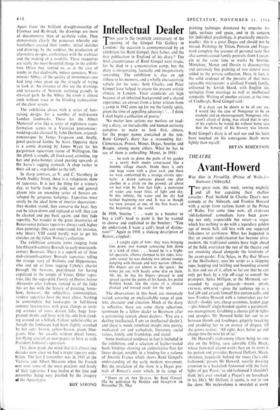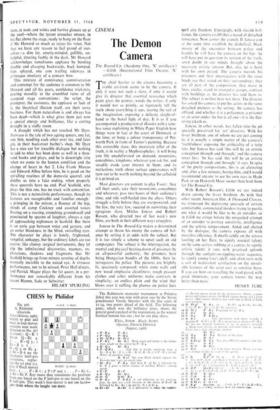THEATRE
Avant-Howerd
Two great men, this week, rowing mightily and all but capsizing their shallow coracles: Paul Scofield in Charles Dyer's new comedy at the Aldwych, and Frankie Howerd with a script from various hands at the Prince of Wales. For some time now, all ci-devant 'old-fashioned' comedians have been grow- ing not only respectable but smart—a vogue which has nothing to do with a legendary golden age of music hall, still less with any supposed folksiness or earthiness. What has happened is that an ancient sophistication has become ultra- modern, the traditional comics have leapt ahead of the field, overtaken the rest of the theatre and are streaking ahead alongside the forefront of the avant-garde: Eric Sykes, in Big Bad Mouse at the Shaftesbury, uses his script as a skipping rope, hopping and twirling and bounding around it, into and out of it, often so far out that he can only get back by a trip off-stage to consult the prompter; Spike Milligan, at the Mermaid, sur- rounded by urgent placards—WHAM, sPLAr, CRUNCH, APPLAUSE—gives the audience up as a bad job and awards himself five curtain calls; and now Frankie Howerd with a remorseless eye for detail—shoddy sets, cheap costumes, leaden gags —pits himself single-handed against a parsimoni- ous management. Grabbing a chorus girl in tights and spangles, Mr Howerd holds her out to us between thumb and forefinger, gingerly tweaking and prodding her in an ecstasy of disgust, till she grows restive: 'All right, dear, better go and change into the next bit of tat.'
Mr Howerd's arch-enemy (there being no one else on the billing, save adorable Cilia Black, whose faux-naif charm works best on its own) is his patron and provider, Bernard Delfont. Mean, obstinate, hopelessly behind the times ('he's old- fashioned,' groans Mr Howerd, wearily drawing attention to a backcloth festooned with the fairy lights of gay Paree, `so old-fashioned I shouldn't think he's ever smoked a Player's on horseback in his life'), Mr Delfont, it seems, is out to run the show. His malevolence is revealed at every turn, in nods and winks and furtive glances up at the roof—where the tyrant crouches unseen, in his flat above the stage, ready to bang on the floor if Mr Howerd so much as raises his voice. Not that we have any reason to feel proud of our- selves—a dim lot, smutty-minded, gullible, un- helpful, tittering feebly in the dark. Mr Howerd acknowledges tumultuous applause by bending double and charging backwards, back humped, hips splayed, one arm trailing sideways in grotesque mockery of a concert bow.
This mixture of connivance, commiseration and contempt for the audience is common to Mr Howerd and all his peers, confidence tricksters, peering moodily at the crumbled ruins of all accepted stage conventions: the script, the prompter, the costumes, the applause or lack of it, the theatrical illusion itself, are their sorry business. For them naturalism is and always has been dead—which is what gives them just now a special energy and brilliance, like a cutting draught in a stuffy room.
A draught which has not touched Mr Dyer. Staircase is the tale of two ageing queers, one fat, one thin, needling each other over tea, and later gin, in their backstreet barber's shop. Mr Dyer has a nice ear for irascible dialogue but nothing to add to what has been done as well in a thou- sand books and plays, and he is downright trite when we come to the human condition and the change of heart in Act 2. Like Frank Marcus and Edward Albee before him, he is good on the spiralling routines of the domestic quarrel, and diddles us into a fake ending, when properly these quarrels have no end. Paul Scofield, who plays the thin one, has no truck with convention. This is not a naturalistic performance, though its features are recognisable and familiar enough: a primping in the mirror, a flounce of the hip, shreds of camp Cockney and assorted voices floating on a roaring, crunching groundswell and punctuated by spasms of laughter, always a sign of approaching nightmare in Scofield. But there is an eerie gap between voice and gesture, and an eerier blankness in the blind, swivelling eyes. The character he plays is lonely, frightened, vengeful, unhappy, but the ordinary labels are too coarse; like clumsy surgical instruments, they let slip the infinitesimal discoveries, nuances, ex- plorations, shadows and fragments that Mr Scofield brings up from minute scrutiny of depths normally invisible to the naked eye. A virtuoso performance, not to be missed. Peter Hall directs, and Patrick Magee plays the fat queer, in a per- formance not remarkably different from his recent Hamm, Sade or Schwitter.
HILARY SPURLING







































 Previous page
Previous page